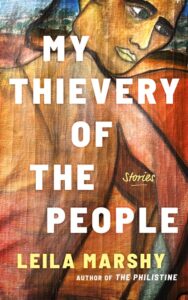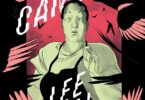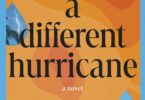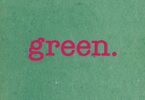Leila Marshy, My Thievery of the People (Baraka Books, 2025), 185 pp., $24.95.
In Leila Marshy’s The Philistine, (LLP, 2018)—a novel that explores issues of hereditary and sexual identity—a Palestinian-Canadian woman travels to Egypt in search of her father and falls in love with an Egyptian woman. My Thievery of the People, her second book, is a collection of sixteen short stories set in locales ranging from Montreal to Egypt to Newfoundland and Las Vegas. The characters and narratives are as varied as the settings and the stories are full of sadness, struggle, and disturbing evidence of the human willingness to exploit and abuse others. Yet what emerges is a generous propensity for resistance and survival.
The first and shortest story, “Blink Twice,” recounts a brief encounter in an unidentified location between the narrator, who uses laughter to deflect, and a woman whose smile is worn as self-protection. It is an elegant account of a fleeting and profound moment of both connection and disconnection between individuals who have experienced trauma.
Marshy never shies from using metaphors or similes and uses a layered one to great advantage at the end of the story: “…a smile rounded across her face like a runaway train and I laughed like a possessed locomotive.” She then closes with, “Anyone watching us would think we were having the time of our lives.” This ending deftly captures many themes in the book including distress, despair, and the ways in which surface appearances belie internal anguish.
In “Evidence of My Thievery of the People,” from which the book takes its title, the narrator, whose father’s business “fell into my lap like a prostitute’s face,” has also inherited his father’s cruel and arrogant treatment of his employees, referring to them not by name but only by their department. When he experiences a haunting sense of kinship with his “coffee girl,” it prompts him to visit her at her home, where he is forced the face the truth of dark family secrets and his own powerlessness outside of the workplace.
“Ramadan” is a story entirely devoid of conversation and interaction. The main character toils all day “rolling and pushing and heaving” dough into cookies, scraps of which are thrown over the balcony to the dogs, before moving to endless tasks of laundry and cleaning. Her husband and children come home, eat, watch television. Only the voice of a woman on the television and later imagining the lips of a lover when she prays, bring her respite from the heavy labourious tasks of the day. Exhausted, she eventually falls asleep alone on a pile of folded laundry.
This sense of domestic entrapment and strife runs through several stories. In “A Thousand and One Nights in Palmyra’s Bed,” a young Egyptian woman dreads the return of her brother, who has become rich working in the Persian Gulf, knowing he will set out to “…find me an ashen husband, an old one, a wet man oozing onto his job and then, afterwards, oozing onto me.” In “Hamdo the Hero,” Hamid is proud to not be a “peasant” in “the old country,” but rather to be living in a Canadian bungalow reading Time magazine. He has a delusional belief he is a superhero named Hamdo man and his brutish antics terrorize his wife and children. In the suspenseful “The Beekeeper,” a bickering couple witness a violent response to domestic abuse during an encounter at a roadside stand outside of Montreal.
Because feelings of isolation and an ominous unease underscore much of the book, the shift to comedy in a couple of stories is a bit jarring, though Marshy’s humour is sharp. “The Job” is a dry comedic diaristic account of a single mother who is fired from a boring job she does not like. In an act of retaliation, she partakes in increasingly brazen acts of office-supply thievery. And “How to: Your Very Own Life,” is a mischievously deadpan account of seven steps to take when separating from your abusive spouse.
“The Ugly Father” echoes the poetic compression of “Blink Twice.” A devoted father takes his young daughter to a playground where they share a heartfelt moment of connection as he pushes her on a swing. The story then travels into the future, in a kind of reverie, and he recognizes she will one day be embarrassed by him, embarrassed to be seen with him, and “embarrassed that the flaws she sees in the mirror are the shortcomings he has bequeathed her.” It then flows forward further to a moment when the daughter will realize her father loves her and is the only person who “isn’t judging, comparing, rejecting, calling her ugly.” In stark contrast with “Hamdo the Hero,” it is a moving expression of paternal love.
In “Winter, Water, the Waiter,” the privilege of western foreigners is on full display as the father of a Canadian family vacationing in Egypt, with cringe-worthy ignorance, wonders why the weather is chilly since Cairo is “practically at the equator.” He is also convinced that they should not pay “tourist prices” for anything. A series of mishaps unfolds, the consequences of which are more dire for the locals than the tourists.
“The Beauty of Disaster” takes place on a clear September morning in Cairo. While driving her beat-up old Suzuki, the narrator recalls phrases her cousin used to say including “the bitter pill of wealth disparity.” Slowly we discover that her cousin was one of terrorists who crashed a plane into the World Trade Center on a similar September morning back in 2001. When she witnesses an extremely wealthy young woman recklessly and unapologetically trash the Mercedes she’s driving, the narrator stops to help. Her acts of kindness are met with insults and mockery—and it sets her on a mission to demand compensation.
The bold range of style in My Thievery of the People is impressive. There is contemporary high realism, historical folklore, satire, and parallel narratives. Some stories have names, places, and situational plots, others do not. Despite these differences, there is a cohesive sensibility to them—one of displacement and discomfort—with brief glimmers of hope. And there is concise movement. The prose is never extraneous or tangential.
The book is a provocative examination of life’s daily and exhausting humiliations, and the limitless chasms that separate us based on class and wealth disparity, as well as misguided colonial beliefs in the right to ownership of place and power over others. As a fisherwoman in Newfoundland in “Proper Ting” says to a ministry worker from Ottawa, “No one is innocent here. Everyone smells of either fish or blood. No wonder the fish are leaving, they were never ours to begin with.”
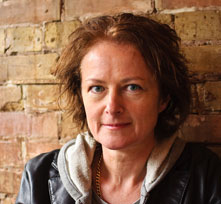 Anne Perdue’s collection of short fiction, I’m A Registered Nurse, Not a Whore, was longlisted for the Frank O’Connor International Short Story Award and shortlisted for the Relit Award. She works as a Senior Editor for the Metcalf Foundation and currently lives in Vancouver.
Anne Perdue’s collection of short fiction, I’m A Registered Nurse, Not a Whore, was longlisted for the Frank O’Connor International Short Story Award and shortlisted for the Relit Award. She works as a Senior Editor for the Metcalf Foundation and currently lives in Vancouver.

